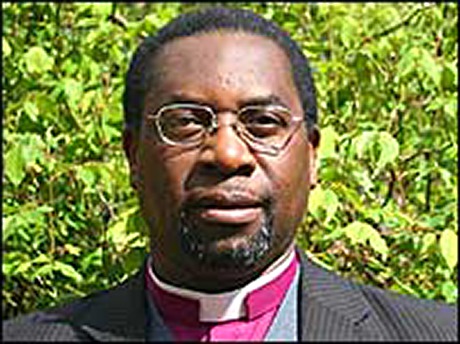Rwandan priest in UK faces probe over allegations of role in 1994 genocide
Rt Rev Jonathan Ruhumuliza was a bishop in Rwanda, where he is accused of being a 'propagandist' for Hutu extremists
By Chris McGreal
http://www.theguardian.com/world/
February 15, 2014
 Rt Rev Jonathan Ruhumuliza, priest at St Mary and All Saints church, Hampton Lovett, in Worcestershire.
Rt Rev Jonathan Ruhumuliza, priest at St Mary and All Saints church, Hampton Lovett, in Worcestershire.
The Church of England is investigating a Rwandan bishop who is now serving as a parish priest in Worcestershire over "disturbing" allegations that he was a propagandist for leaders of his country's 1994 genocide and complicit in sending Tutsis to their deaths.
The church said it had been unaware of the most serious accusations when it appointed the Right Rev Jonathan Ruhumuliza in 2005, even though they had been widely aired during and after the genocide, in which 800,000 Tutsis were murdered, and which led to a schism within the Anglican church in Rwanda.
The church said it was "disturbed" by allegations - made in human rights reports and brought to its attention by an Observer investigation - that Ruhumuliza collaborated in endangering Tutsis with another Anglican bishop, who was arrested by a UN tribunal on genocide charges.
Ruhumuliza, who serves St Mary and All Saints church in Hampton Lovett, Worcestershire, is also the target of an investigation by Rwandan authorities. Peter Selby, former bishop of Worcester, who appointed Ruhumuliza, called on the church to ask police to investigate the "deeply shocking" allegations.
The Observer has learned that Ruhumuliza was denied a work permit for two years by the Home Office, in part because of statements by him effectively denying the genocide, and amid concerns over his actions in Rwanda when he was accused by his own archbishop of being an "errand boy" for the Hutu extremist government. The Home Office reversed the decision after the Church of England hired a lawyer for Ruhumuliza.
In the 1990s, Human Rights Watch described him as "acting as a spokesman for the genocidal government" for his efforts to deceive foreign churches and powers into believing that the politicians and soldiers leading the killings were in fact trying to stop them.
The London-based group African Rights named Ruhumuliza in a 1998 appeal to the World Council of Churches to examine the complicity of Anglican clergy in the genocide. It accused him not only of being a "propagandist" for the Hutu extremist government, but of working with another bishop in refusing shelter to Tutsis facing imminent death and of exposing others to attack.
Selby said: "The accusations were never drawn to my attention. If I had ever been aware of the contents of the document, I don't think it would have entered my mind that we could give him a place unless he gave me answers to the questions that that document raises which I found satisfactory.
"If there is a level of complicity in the genocide of the kind that the human rights document states then I find it completely astonishing and unacceptable that that's not dealt with by due legal process. Which would result, I think, first of all in his not being allowed to stay here but which might result in the matter being referred to criminal authorities."
Selby said that after Ruhumuliza's appointment to his diocese he became aware of allegations that the bishop acted as a propagandist for the genocide regime but had received what he regarded as satisfactory explanations from him. However, he said that now he has seen contemporary news and human rights reports, Ruhumuliza's "account doesn't square" with them.
Selby said checks on the clergyman's background were the responsibility of the Church of England headquarters at Lambeth Palace and he believed there had been "a very bad, probably a serious failure, of all sorts of systems and persons".
The church said Ruhumuliza's appointment was made following checks in which "no evidence was found of complicity in the Rwandan genocide". It said it is now investigating the allegations in the African Rights document.
But Ibuka, the genocide survivors' association in Rwanda, which has been campaigning for clergy implicated in genocide and now living in Europe to be brought to trial, criticised the Church of England. Ibuka's president, Jean Pierre Dusingizemungu, said it had failed to examine Ruhumuliza's past when there were reasons for it to ask questions.
He said: "We do not see why churches refuse to face history and reality. Instead of hiring and promoting these people, they should check on their role during the genocide. These people are known. We do not see how they can hold positions when there are files on them."
Ruhumuliza, who also works as ministry, education and training officer for black and Asian Anglicans at the Queen's Foundation for Ecumenical Theological Education in Birmingham, initially agreed to be interviewed about his actions in 1994 but later declined.
Chris McGreal's Guardian Short ebook on the legacy of the Rwandan genocide will be published in March.













